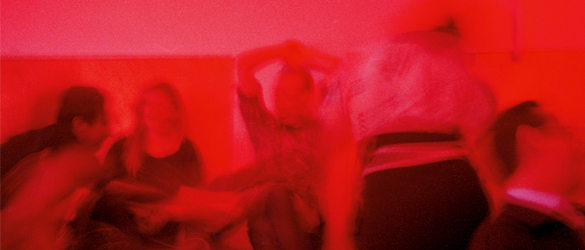Some artists have an inexhaustible creative vitality, an undying obsession with expression, an inability to be quiet. Spenser Krug is such an artist. The Wolf Parade and Sunset Rubdown frontman seems to put every impulse in his consciousness to music. In his most recent endeavor though, Krug seems to have reached past even his conscious thoughts, through dreams, to give us Moonface.
“I’ve got a spirit,” the album opens, “made out of sand.” Thematically it’s a setting of the stage for the abstract image-weaving to come, but it also explains, or at least hints at, what this album is to its creator and why it even exists. Organ Music Not Vibraphone Like I’d Hoped is the first LP from Krug in his lunar guise, following an EP which consisted of a single, twenty-minute track. Knowing that the EP came with a ten page dream journal, provides appropriate, if not vital, context for the trip down the rabbit hole that is Organ Music.
“Sometimes it slips through my fingers / Back onto the beach / In some kind of lust / To return to the violence of the ocean floor.” He’s singing about his afore-mentioned spirit, made out of sand, and in a way stating the intentions of the album. Like the EP, Krug has again turned to a lesser-used instrument to paint a surreal soundscape in which his equally surreal lyrics can work together to evoke feelings more primal. By setting his dreams to the marimba or organ, grand and complex instruments which despite their size require only one player, he creates a direct dialogue from player to audience. For the material at hand in the Moonface catalogue, innate lusts described through dreams, such instruments are fitting. Their sound is strange yet familiar, not heard in the everyday but known to most, and critically those sounds can come without diffusion from one person.
So it makes sense that Moonface is a solo project, a first for Krug. He’s saved perhaps his most intimate material to be played by himself. Even with all the lyrical abstraction, the LP feels dead serious and distinctly sad at times. The organ, just by its typical cultural associations, further enhances this heaviness by lending the music an almost religious air.
On “Fast Peter,” the narrator tells the tale of Peter, a simple but idealistic guy, with amusement and even some hopefulness, “So, Peter’s leaving town / Who even does that anymore? / He’s gonna go find the one.” But even here, on the only song on the LP that could be possibly called “upbeat” or “catchy,” the weariness wins out. After almost five minutes of uptempo loops, a slow, almost mournful organ takes control of the song. Peter’s idealistic love, like the quick loops, simply is not tenable in the world Krug sees, and the excitement brought about by the idea of Peter quickly fades to sadness as he croons, “She’s the one, / The one that he thinks of when he thinks of love.”
On “Fast Peter,” the narrator tells the tale of Peter, a simple but idealistic guy, with amusement and even some hopefulness, “So, Peter’s leaving town / Who even does that anymore? / He’s gonna go find the one.” But even here, on the only song on the LP that could be possibly called “upbeat” or “catchy,” the weariness wins out. After almost five minutes of uptempo loops, a slow, almost mournful organ takes control of the song. Peter’s idealistic love, like the quick loops, simply is not tenable in the world Krug sees, and the excitement brought about by the idea of Peter quickly fades to sadness as he croons, “She’s the one, / The one that he thinks of when he thinks of love.”
At the end of “Whale Song,” Krug walks us through one of his dreamscapes as the music reaches crescendo. He seems helpless as he looks at “the flowers growing out [his] remains.” He sets a tone of haunting indifference, “I would say it’s not the way I would have had them / But I would also say that it will work just the same.” The music of Moonface communicates a complete, devastating weariness.



